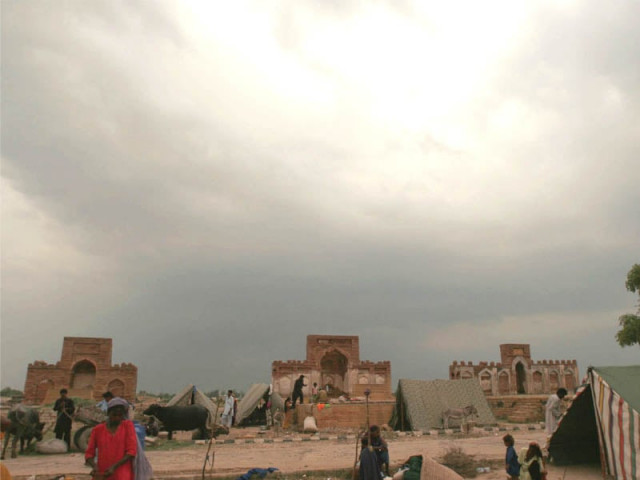Repatriated flood survivors: Back in the camps, it was better for the women
Local farmers get back to ‘slave’ labour, landlords say all’s fair.

Being displaced from home was a blessing in disguise for some people. Salma, a mother in her early twenties, says she is less secure back home in her village. “My husband works very hard in the field and if I am ever late in preparing meals, he beats me badly,” she says, adding that in the camp “there was relief for us women”.
Women cannot easily be spoken to. A conversation with Salma was possible only after taking permission from the men of the village.
On the difference between living in a flood relief camp and her village in Shikarpur district, she told The Express Tribune, “wohi farq hai jo jannat aur dozakh main hota hai.” (The difference is the same as it is between heaven and hell)
“Here I have to do work all day, then cook meals and look after the children, while in the relief camp we didn’t have to work in the fields and we were getting cooked food twice a day,” she says.
Salma’s children were also studying in the tent schools set up in relief camps, but now that they are home they spend the day playing in the fields. “Teachers are not ready to come so far. So you can see..” she says, pointing towards her children playing outside.
After coming back to the villages, the relationship between peasants and landlords has resumed from where it was left off. Farmers say they are treated as personal servants, while landowners claim that it’s a fair relationship.
Syed Ansar Shah, a landlord in the Garhi Syed village says he spends more and gets less, while the peasants spend less and get more. Shah says he pays taxes, purchases half the fertiliser and owns the land, yet the workers get half the harvest. “This is not all,” he said, “We provide housing to the peasants and healthcare if they are unwell.”
Another landlord, Nawab Khan Pathan from Zarkhel village, Khanpur taluka had similar views. He gets emotional when asked about not helping the peasants especially during last year’s flood and afterwards. “Who says we don’t help them? You are talking about flash floods of last year, when like other areas, our lands were also inundated and crops damaged. We are the ones who sustained more loss,” he said adding, “Everyone only sympathises with the peasants.” The peasants are happy with their lives because they get stocks of grain for the whole year after working for only four or five months”, he added.
“When our peasants fall sick, we get worried and rush them to the doctor, because they are our tools.”
In contrast, villagers say they are still treated as slaves. They say that they arrange the seed and pay for half of the fertiliser, pesticides, machinery and for leveling the land. We do all the work, but the landlords get two-thirds of the harvest.
“When our villages were washed away last year and we were forced to live in tents or by the roadside, and the landowners, instead of pacifying us, left for Karachi and Islamabad to live in their luxurious houses,” farmers said. “Farming is not enough to satisfy the landowners, our wives and children have to work too with no extra money.”
“Sahab, hum kia hamari zindagi kia?” (Who are we, what is our life?) Salma says, while throwing away some rotten tomatoes. “Our life is like that of a buffalo – good for the owner as long as she gives sufficient milk,” she says, adding “And when she turns dry, the owner sells her to the butcher.”
Published in The Express Tribune, July 14th, 2011.



















COMMENTS
Comments are moderated and generally will be posted if they are on-topic and not abusive.
For more information, please see our Comments FAQ